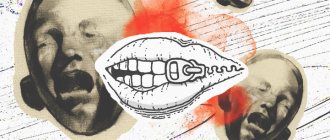Causes of passive aggression
To more accurately understand what passive aggression is, you should also understand the causes of this phenomenon. They can be different and depend on many circumstances. Psychologists believe that the most common causes of passive-aggressive behavior are the following factors:
- Reluctance to take responsibility for the conflict. A passive aggressor strives to look like a positive character in any situation. Therefore, he tries to piss off his opponent so that he will be the first to demonstrate conflict behavior.
- Negative emotions caused by personal reasons. It happens that a person has a personal grudge or other emotions that he cannot express directly. And since he has nothing to accuse his opponent of, he begins to behave passive-aggressively towards him.
- Inability to confront an opponent openly. There are quite a lot of such situations. For example, the opponent occupies a more advantageous position, has a certain influence, is stronger physically, or is good at defending his position in a dispute.
- Inability to behave with dignity in conflicts. A person with conflict usually knows that by showing aggression openly, he puts himself in a bad light. Therefore, he prefers to act secretly , trying to piss off his opponent.
- Fear of the opponent's possible reaction. Implicit aggression is a good way to avoid unpredictable consequences.
- Inability to express complaints directly. This problem is present in most people - it is difficult for all of us to directly say that we don’t like something. And some people, instead of simply asking the other person not to do something, begin to secretly “punish” him for bad behavior.
What is passive aggression?
Passive aggression is a pattern of behavior in which a person expresses his aggressiveness in a hidden or indirect form. At the same time, he himself is aware of his aggressive intentions, but outwardly portrays goodwill or neutrality. As a rule, passive aggression occurs in situations where a person is afraid of a backlash or wants to avoid judgment, trying to show others that he is a positive character in a given situation.
By showing passive aggression, a person pursues certain goals, but at the same time avoids honest open conflict. And if the opponent loses his temper and begins to behave aggressively, this will allow him to be blamed for the conflict situation.
The term “passive aggression” was coined by the American psychiatrist William Menninger. He used it to describe the behavior of soldiers who refused to follow orders and showed increased resentment. Moreover, long before Menninger, this phenomenon was studied by Sigmund Freud, who considered passive aggression to be the result of the displacement of negative emotions into the unconscious.
Researchers believe that the tendency toward passive aggression develops in early childhood. This happens if a child regularly feels that adults are showing him unfair cruelty, to which he cannot respond in any way. He understands that he depends on his parents and is forced to fulfill all their demands, so he develops and strengthens the desire to sabotage their orders. Thus, passive aggression is infantile behavior associated with fear of responsibility for actions committed openly.
Passive aggression is closely related to toxicity, although the two concepts should not be equated. Toxicity is often directed at third-party objects, but still creates unpleasant pressure on the psyche of the interlocutor. And passive-aggressive behavior is usually directed precisely at the person with whom the interaction is taking place.
Drive theory: aggression is a “gut instinct”
The concept of “aggression” became popular thanks to psychoanalysis. Joy is the main feeling that governs human behavior. Equally important feelings or drives are the desire for pleasure (libido) and the instinct of destruction or death (destrudo). Suppressing the death instinct, just like suppressing libido, can lead to serious mental disorders. If a person cannot throw out aggression, then it turns against him.
From the point of view of psychoanalysis, the forms of such suppressed aggressive (auto-aggressive) actions are diverse. Some people nervously bite their nails, others lose weight before their eyes. There are also cases of suicide. From this theory we can draw the following conclusions: if the instinct of destruction is inherent in a person, then, of course, it should not be suppressed. On the contrary, it must be manifested in its entirety. In addition, a person must learn to control this instinct. Otherwise, it may lead to self-destruction or destruction of the environment.
Learning theory: aggression is learned
According to other theories, aggressive behavior can be explained by the fact that a person learns to be aggressive in childhood. Children believe that if they behave aggressively, they will be successful. They see that other children and their parents behave aggressively in some situations and because of this they achieve results. Therefore, if children think that this way they can achieve the desired results, then they begin to copy this behavior.
Based on this theory, it can be argued that the media, especially television, have a great influence on the aggressive behavior of children. However, research shows that this opinion is largely erroneous. Although children tend to imitate certain characters from films, the decisive influence is still exerted by the “real people” (relatives, parents, peers) who surround them and from whom they actually learn something.
Provoking aggression
Almost everyone has at least once experienced or observed from the side how one person deliberately provokes another into aggression. This manipulation can be used for various purposes. It happens that people provoke others into aggression in order to take the position of a victim and make the person feel guilty so that later he will do what they want. Some people lack attention and emotions, so they try to get them in such unhealthy ways. Well, someone provokes a conflict in order to throw out the accumulated negativity in response - this is how, as a rule, people with displaced aggression behave.
In order not to succumb to provocation, you need to try to calm down, concentrate on your breathing and look at the situation from the outside: realize that not everything is okay with this person if he behaves this way. You can imagine this person as a small, squeaky animal. Or mentally imagine how you hit him with all your might. If the provocateur does not receive any external response from you, then he will “lose” and calm down.
Author: practicing psychologist S.P. Chikunova
Can't cope with your aggression or do you constantly provoke others to it? Sign up for a consultation with a psychologist by phone. or leave a request on our website.
Recommendations for solving the problem
How can you solve the problem of aggressive behavior if you feel that you are becoming more susceptible to it? Even if the famous song says that “you shouldn’t bend to a changing world”: in this case, the willingness to change along with the surrounding reality is the best thing you can do for yourself in order to avoid negative consequences.
- Do not pay attention to any prohibitions and taboos. Do you want to learn to roller skate? Forward! Just remember to wear protection and call your grandson to show you how it's done. Have you decided to master the computer and plan to “sit” on the Internet during long evenings instead of sitting on a bench in the yard? Once again, your grandson will help you, and don’t pay attention to your neighbors shaking their heads at you disapprovingly.
- Start doing some feasible physical exercises: breathing exercises, yoga, Nordic walking. All this saturates your body with oxygen and fills life with new colors. Why not take part in the city competition for the fastest old lady or in the chessboard lifting championship?
- As many positive emotions as possible. Watching animals brings joy - watch TV shows about the animal world more often. If you like watching kids play, go for walks on the playground more often, and you might see that some mother needs your help and you will make friends with her charming daughter.










